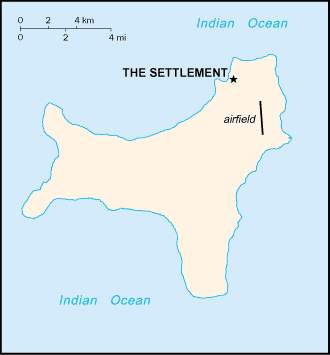|
|
Legend:
 Definition
Definition
 Field Listing
Field Listing
|
Background:
|


Named in 1643 for the day of its discovery, the island was annexed and settlement was begun by the UK in 1888. Phosphate mining began in the 1890s. The UK transferred sovereignty to Australia in 1958. Almost two-thirds of the island has been declared a national park.
|
|
Population:
|


474 (July 2002 est.)
|
|
Age structure:
|


0-14 years: NA%
15-64 years: NA%
65 years and over: NA%
|
|
Population growth rate:
|


-9% (2002 est.)
|
|
Birth rate:
|


NA births/1,000 population
|
|
Death rate:
|


NA deaths/1,000 population
|
|
Net migration rate:
|


NA migrant(s)/1,000 population
|
|
Sex ratio:
|


NA
|
|
Infant mortality rate:
|


NA deaths/1,000 live births
|
|
Life expectancy at birth:
|


total population: NA years
female: NA years
male: NA years
|
|
Total fertility rate:
|


NA children born/woman
|
|
HIV/AIDS - adult prevalence rate:
|


NA%
|
|
HIV/AIDS - people living with HIV/AIDS:
|


NA
|
|
HIV/AIDS - deaths:
|


NA
|
|
Nationality:
|


noun: Christmas Islander(s)
adjective: Christmas Island
|
|
Ethnic groups:
|


Chinese 70%, European 20%, Malay 10%
note: no indigenous population (2001)
|
|
Religions:
|


Buddhist 36%, Muslim 25%, Christian 18%, other 21% (1997)
|
|
Languages:
|


English (official), Chinese, Malay
|
|
Literacy:
|


NA
|
|
Economy - overview:
|


Phosphate mining had been the only significant economic activity, but in December 1987 the Australian Government closed the mine. In 1991, the mine was reopened. With the support of the government, a $34 million casino opened in 1993. The casino closed in 1998. The Australian Government in 2001 agreed to support the creation of a commercial space-launching site on the island, slated to begin operation in 2003.
|
|
GDP:
|


purchasing power parity - $NA
|
|
GDP - real growth rate:
|


NA%
|
|
GDP - per capita:
|


purchasing power parity - $NA
|
|
GDP - composition by sector:
|


agriculture: NA%
industry: NA%
services: NA%
|
|
Population below poverty line:
|


NA%
|
|
Household income or consumption by percentage share:
|


lowest 10%: NA%
highest 10%: NA%
|
|
Inflation rate (consumer prices):
|


NA%
|
|
Labor force:
|


NA
|
|
Labor force - by occupation:
|


tourism 400 people, mining 100 people (1995)
|
|
Unemployment rate:
|


NA%
|
|
Budget:
|


revenues: $NA
expenditures: $NA, including capital expenditures of $NA
|
|
Industries:
|


tourism, phosphate extraction (near depletion)
|
|
Industrial production growth rate:
|


NA%
|
|
Electricity - production:
|


NA kWh
|
|
Electricity - production by source:
|


fossil fuel: NA%
hydro: NA%
other: NA%
nuclear: NA%
|
|
Electricity - consumption:
|


NA kWh
|
|
Agriculture - products:
|


NA
|
|
Exports:
|


$NA
|
|
Exports - commodities:
|


phosphate
|
|
Exports - partners:
|


Australia, NZ
|
|
Imports:
|


$NA
|
|
Imports - commodities:
|


consumer goods
|
|
Imports - partners:
|


principally Australia
|
|
Debt - external:
|


$NA
|
|
Economic aid - recipient:
|


$NA
|
|
Currency:
|


Australian dollar (AUD)
|
|
Currency code:
|


AUD
|
|
Exchange rates:
|


Australian dollars per US dollar - 1.9354 (January 2002), 1.9320 (2001), 1.7173 (2000), 1.5497 (1999), 1.5888 (1998), 1.3439 (1997)
|
|
Fiscal year:
|


1 July - 30 June
|
|
Military - note:
|


defense is the responsibility of Australia
|
|
Disputes - international:
|


none
|
This page was last updated on 1 January 2002
|




